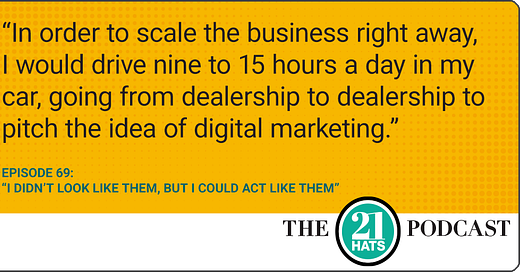Jack Stack: This Thing Isn’t Over Yet
The SRC CEO writes about what he’s doing to get employees vaccinated in Southwest Missouri.
Good morning!
Here are today’s highlights:
How businesses are coping with inflation.
Swimply is the Airbnb of backyard swimming pools.
And in our latest 21 Hats Podcast, we introduce a new regular..
REOPENING
Jack Stack, CEO of SRC Holdings, writes that he and SRC may have celebrated a little too soon—especially since they’re based in Southwest Missouri, a Delta variant hotspot where vaccination rates are low: “As a business, we have avoided mandating vaccinations even though we think the vaccination rate among our associates in Springfield tracks at a similar rate to our community’s. It’s been my experience that forcing people to do anything, including something you think can help save their life, usually doesn’t go very far. So, in what has become typical for our company over the years, we decided to tackle this challenge by turning it into a game. One of the fundamental practices at the root of the Great Game of Business is something we’ve come to call a MiniGame—which you can think of as a short-term incentive plan designed to solve a problem inside the business without confrontation.”
“Every associate with a completed vaccination card gets $100.”
“Associates who are fully vaccinated are then eligible for a series of weekly raffles starting August 10 with over $10,000 in prizes per week. Prizes range from a Yeti cooler and an iPad to a 50-inch smart TV.”
“Vaccinated associates are then eligible for the grand prize: the chance to win one of six ATVs that will be raffled off on September 2.” READ MORE
A federal judge rules that Indiana University can require proof of vaccination: “U.S. District Judge Damon R. Leichty said the university system acted reasonably to protect public health when it required all of its students, faculty and staff to be fully vaccinated against Covid-19 by July 1, with limited medical and religious exceptions. In saying so, the judge denied an injunction sought by eight college and graduate students who claimed the university’s vaccine policy unconstitutionally infringes on their bodily autonomy and medical privacy. The case is among the first to tackle the constitutionality of Covid-19 vaccine requirements at public universities.” READ MORE
THE 21 HATS PODCAST
Episode 69: “I Didn’t Look Like Them, But I Could Act Like Them” This week, we introduce a new regular on the 21 Hats Podcast team. Her name is Diana Lee, and she’s the founder of a digital marketing agency. In a conversation with Jay Goltz and Stephanie Stuckey, Diana explains how she got her business off the ground by helping car dealers target diverse communities within their markets, how she bootstrapped her business by convincing those car dealers to prepay 50-percent upfront, and how her first attempt at building a software platform ended with her spending $1 million on a platform that no one wanted to use.
You can subscribe to The 21 Hats Podcast wherever you get podcasts.
THE ECONOMY
How businesses are coping with rising costs: “Many businesses — from restaurants to parts distributors — are raising prices where they can. Most people have been softening up to these increases. Businesses that haven’t had the opportunity to do this for years — even a decade or more thanks to historically low inflation rates — are implementing across-the-board price increases that not only cover their added costs but add a little more profit. Unfortunately, raising prices is easier said than done for some.”
“Both Rosania and Wall sell mostly to the government under negotiated, fixed contracts, which makes it almost impossible to increase their prices for these customers. So for them it’s about controlling costs.”
“‘I recently brought in about nine trailer loads of critical material,’ said Woll, who financed some of the purchases by taking advantage of still-low interest rates. Woll is doing this as a hedge against future price increases.” READ MORE
Officially, the recession lasted just two months—and was literally over before we knew it had begun: “The National Bureau of Economic Research, the semi-official arbiter of U.S. business cycles, said Monday that the recession had ended in April 2020, after a mere two months. That makes it by far the shortest contraction on record — so short that by June 2020, when the bureau officially determined that a recession had begun, it had been over for two months.”
“But while the 2020 recession was short, it was unusually severe. Employers cut 22 million jobs in March and April, and the unemployment rate hit 14.8 percent, the worst level since the Great Depression. Gross domestic product fell by more than 10 percent.”
“The United States has nearly seven million fewer jobs than before the pandemic, and while gross domestic product has most likely returned to its pre-pandemic level, thousands of businesses have failed, and millions of individuals are still struggling to get back on their feet.” READ MORE
HUMAN RESOURCES
Maybe we should have a meeting to talk about this? “As a new era of remote and in-office work begins, some companies are trying to bring definition to daily schedules—by making some hours off-limits for meetings. The tactic, called ‘core hours,’ sets times—say, between 10 a.m. and 2 p.m. or 1 p.m. and 4 p.m.—when bosses require employees to be online and available for Zoom meetings, project collaboration and other exchanges. Any other time is a meeting-free zone. By having certain hours, or days, when everyone is ‘on,’ the idea goes, employees have more freedom and flexibility to do solo work the rest of the time.”
“Atlanta-based scheduling software maker Calendly restricted meetings to between noon and 5 p.m. Eastern Time after noticing that many were being scheduled at times that cut into its far-flung employees’ evening plans or early morning routines, Calendly Chief Executive Tope Awotona said.”
“‘All we care about is that you get your job done from anywhere, you hit your goals, and you make yourself available during what we call our core hours,’ said Mr. Awotona, whose company plans to let staff continue to work remotely yet still gather at times in co-working spaces.”
“‘If you give people from nine until five to schedule meetings, they’ll fill the day full of meetings,’ leaving no time to get other work done, said Brian Elliott, vice president of Slack’s Future Forum, a consortium launched by the company to help businesses rethink the future of work.” READ MORE
OPPORTUNITIES
Now there’s an Airbnb for private swimming pools: “Jim Battan’s tree-lined swimming pool at his home outside Portland, Ore., had been sitting untouched since his youngest daughter moved out two years ago. Then in September, he listed it through an online platform for renting private pools. He booked the pool three times within the first two hours, and says he has hosted 2,700 guests in less than a year. Mr. Battan expects to have earned $111,000 by the end of the summer, which would just cover the $110,000 he and his wife spent on the custom-built pool eight years ago.”
“He is one of 13,000 pool owners in 125 markets across the U.S., including cities like Los Angeles and Austin, Texas, who are cashing in on their underused pool by listing with the company Swimply, which some media reports have dubbed the ‘Airbnb for backyard pools.’”
“Swimply said its pool owners have made about 122,000 bookings since the start of 2020. Business began picking up before the Covid-19 pandemic, but it boomed during the health crisis as public pools closed and people sought to make extra cash or safely gather after months of lockdown.”
“Hosts on average earn between about $5,000 and $10,000 a month, according to Asher Weinberger, Swimply co-founder and chief operating officer. Most pool owners charge between $35 and $50 an hour, while Swimply collects 15 percent from the hosts and another 10 percent from the guests.” READ MORE
FOOD & BEVERAGE
The golden age of New York City food trucks may be over: “Food trucks and cart vendors are part of the city’s fabric, fast and inexpensive options for hungry office workers, retail employees, students and out-of-town visitors looking for anything from chicken and rice to coffee and an egg sandwich to lobster rolls and even steak meals. But for now, these vendors are primarily watching and waiting. Some offices have begun bringing employees back and there has been an increase in tourists, but the bulk of the usual customer base has not yet reappeared.”
“Many are recent immigrants who often have obtained the $200 city-issued permit on the underground market, paying as much as $25,000 over two years to the person who holds the permit, even during the pandemic.”
“Before the pandemic, [M.D. Alam’s] sales totaled $3,000 a day. Now Mr. Alam is barely making $50 a day in profits after paying $350 in operating expenses.”
“Covid-19 cases in New York City, meanwhile, have started to rise at a startling pace, up an average of 203 percent over the past 14 days.” READ MORE
THE 21 HATS CONVERSATION
Last month, at the Tugboat Institute Summit, I heard one of the best talks I’ve ever heard at a business conference and one of the few to get a standing ovation. It was given by Mel Gravely, who is CEO of TriVersity Construction and who is about to publish a book called “Dear White Friend.” Tomorrow at 3 ET, Mel will join me for a 21 Hats webinar conversation about how he managed to become CEO/owner of a construction business, why he chose to write a book addressing race from the perspective of a business owner, and how he, too, has struggled to hire for diversity. Bring your own questions. REGISTER HERE
If you see a story that business owners should know about, hit reply and send me the link. If you got something out of this email, you can click the heart symbol, you can click the comment icon below, and you can share it with a friend. Thanks for reading, everyone. — Loren





